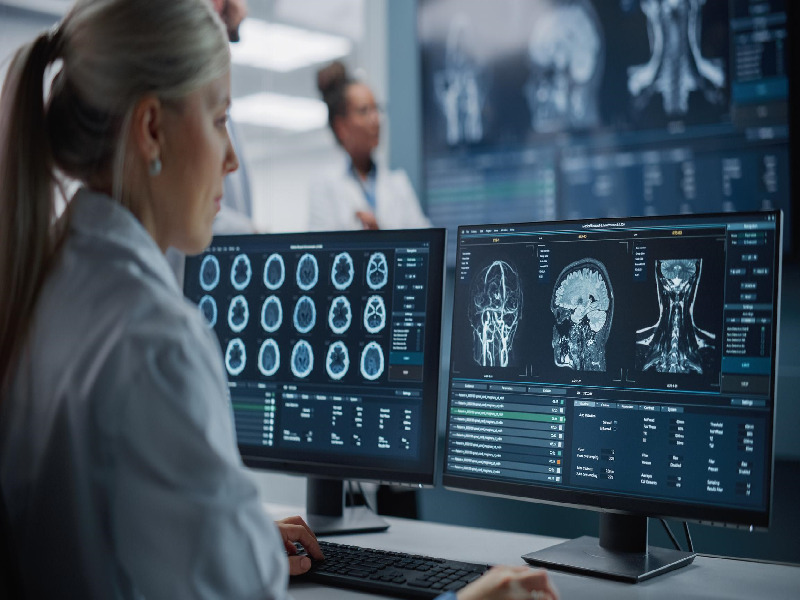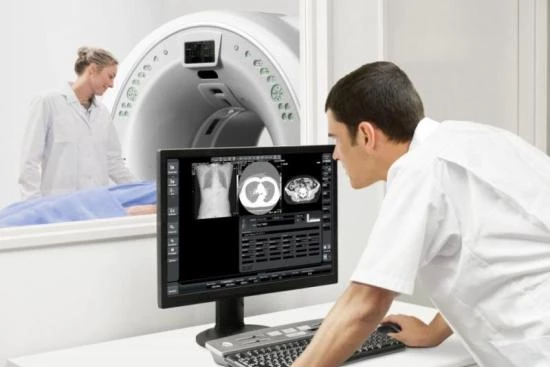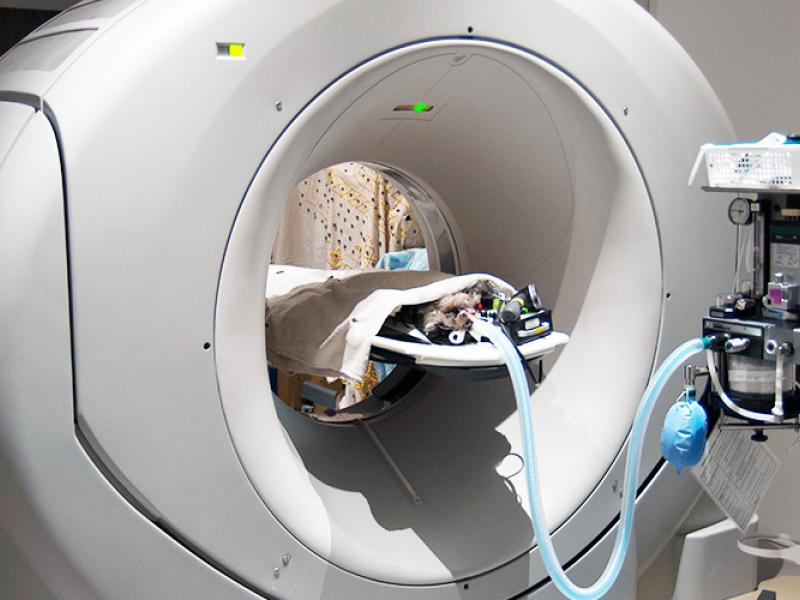Computed tomography (CT-Scan),more commonly known as tomodensitometry scan, is a revolutionary diagnostic imaging technique.
Unlike conventional X-rays, which produce overlapping two-dimensional (2D) images, CT uses low-dose X-rays and advanced computer technology to produce cross-sectional and even three-dimensional (3D) images.
This technique provides detailed images of every part of the body, including bones, muscles, fat, organs and blood vessels.
A CT scan may be recommended by your doctor to help :
- Study the brain, spine, thorax, abdomen or pelvis
- Identify the size, shape and location of tumors
- Find out how far the cancer has spread and whether it is in nearby organs and tissues
- Damage the cells in the body
- Increase the possibility of cancer developing
- Cause an allergic reaction
- X-ray
- MRI
- Between 30 and 60 minutes
Tomdensitometry (CT-Scan) prices in Turkey
The price of a computed tomography (CT) scan in Turkey varies depending on the area of the body being scanned and the type of scan being performed. Typically, you can expect to pay between $400 and $1,200 for a standard CT scan.
Turquie Santé can help you find the best CT scan options in Turkey. We put you in touch with healthcare facilities known for their expertise and state-of-the-art CT equipment. We make sure you choose the best clinics and radiologists in Turkey.
Our team of experts will guide you every step of the way, from booking your appointment to interpreting your results.
Turquie Santé is your best partner for the best medical assistance throughout the diagnosis or treatment process.
If you need help, contact us today for a free teleconsultation and personalized quote!
Best Clinics with Verified Reviews

- Multispecialized hospital
- 7 operating rooms
- Capacity é of 170 beds

- Multispecialized hospital
- Hospital founded in 2007
- Very good reputation in ENT department
Computed tomography (CT): What is it?
Body Computed Tomography (CT),which is performed at the Diagnostic Imaging Department in Turkey, uses the latest X-ray technology. This technique provides physicians with an invaluable tool for the diagnosis and detection of various pathologies and clinical conditions.
Due to its unrivaled accuracy, CT has become an essential tool in medical diagnosis. It is particularly useful in emergency situations, allowing doctors to quickly assess patients involved in traffic accidents or other trauma and detect any internal lesions.
CT is not limited to emergency situations. It can be used in many areas of medicine to examine the entire human body. Whether used to diagnose disease, assess the extent of injury, or plan medical or surgical treatment, CT provides physicians with an unparalleled view of the human body, contributing to more precise and effective care.

Computed tomography (CT-Scan) : In which cases?
Your doctor may recommend a CT scan for:
- Diagnose musculoskeletal disorders such as bone tumors and fractures.
- Accurately locate a tumor, infection, or blood clot.
- Directing procedures such as surgery, biopsy, and radiation therapy.
- Detect and monitor diseases and conditions such as cancer, heart disease, lung nodules, and liver masses.
- Monitor the effectiveness of specific treatments, such as cancer treatment.
- Detect internal injuries and internal bleeding.
Course of the CT scan procedure in Turkey
To perform a CT scan, the patient lies on a table that passes through a circular scanning machine. The table is positioned so that the patient is in the center of the traverse. The X-ray machine rotates to produce "slice" images of the body. Each rotation produces "slices" of the body. These images show how the X-rays pass through the body, providing detailed information about internal structures.
The computer then processes the data from the X-ray transceivers to produce a cross-sectional image on a video screen. By moving the table in the cradle, physicians can perform multiple examinations of the same organ or the entire body.
Preparing for tomodensitometry
Depending on the organ or structure to be examined, you may need to:
- Do not eat or drink anything for a few hours the day before the test.
- Take laxatives.
- Take an enema.
- Remove any metallic objects worn, including jewelry, glasses, or suspenders (if possible).
The contrast product
Depending on the organ to be examined, a special dye called a contrast medium is needed for some CT scans to highlight the area of the body to be examined. The contrast medium blocks x-rays and appears white in images, helping to reveal blood vessels, intestines, or other structures. The patient can receive contrast material either orally; either intravenously or through an enema.

Tomodensitometry results
After the scan, the radiologist analyzes the image and writes a report. The CT scan report is sent to the doctor who ordered the test. He or she will discuss the results with you at a future appointment. Your doctor will receive a copy of the results.
If a contrast dye is used, it is recommended that you stay well hydrated (water, tea, coffee, soup, juice, etc.) for the rest of the day. This will allow you to urinate frequently to get rid of the dye quickly. Other instructions may be given depending on your situation. Within 24 hours of the test, check for any acne on your skin and tell your doctor if you have acne.
Complications of a CT scan
A CT scan may give rise to several complications:
Radiation exposure
During a scan, you will be exposed to ionizing radiation. Because CT scans collect more detailed information, the rate of radiation in a CT scan is higher than the rate you will be exposed to on a regular x-ray. Therefore, the low doses of radiation used in CT scans do not cause long-term risks, however, higher doses may slightly increase the risk of cancer.
Computed tomography remains an effective measure. In fact, radiologists in Turkey use the lowest possible dose of radiation to obtain the medical information they need. What's more, the latest and fastest machines and technologies use less radiation than ever before.
Risks affecting fetuses
If you are pregnant, you should tell your doctor. Although the radiation from a CT scan is unlikely to harm an unborn baby, your doctor may recommend another type of test, such as an ultrasound or magnetic resonance imaging, to avoid exposing the fetus to radiation.
Share this page






